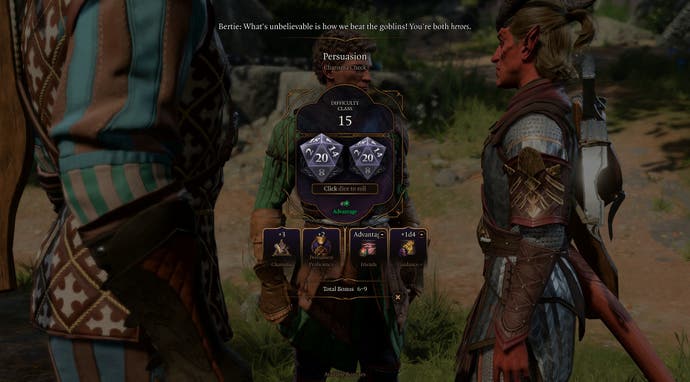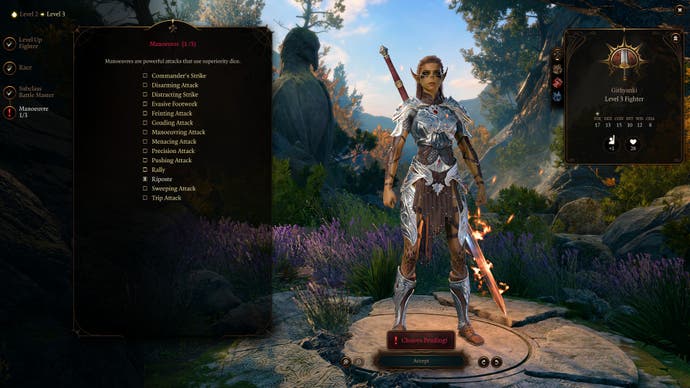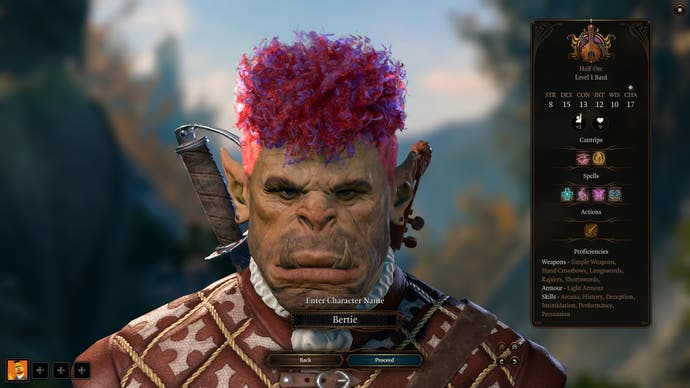Why Baldur's Gate 3's faithful recreation of Dungeons & Dragons is so exciting
Roll, play.
Baldur's Gate 3 comes out on PC today and people seem to be talking about it everywhere. Developer Larian has done great work with the Divinity: Original Sin games and built a strong following, so a lot of the excitement is unsurprising. What does surprise me is where the other surge of excitement is coming from, because it's something I haven't seen before. It's a surge coming from outside of video gaming, from the colossal community surrounding Dungeons & Dragons.
D&D has grown in popularity in recent years, thanks to mainstream representation in Stranger Things and actual-play blockbusters like Critical Role. But it's not as if Baldur's Gate 3 is the first Dungeons & Dragons video game to ever exist - far from it. There have been many - there have been so many. And even when RPGs aren't directly based on Dungeons & Dragons, they're often heavily inspired by it, much like Divinity: Original Sin. But what's new here, and what's exciting people so much, is how close BG3 seems to be to the experience of playing tabletop D&D.
That closeness is something I didn't appreciate before I started playing D&D, around the same time Baldur's Gate 3 arrived in early access, funnily enough. All my previous experience of D&D came from video games, where to me it was just another set of rules. I didn't see anything particularly special in it.
But now my understanding has changed and I can see something magical happening. Baldur's Gate 3 isn't merely using D&D for its setting or fantasy flavour, but recreating its rules almost exactly. And as a result, D&D and Baldur's Gate 3 are in many ways mutually beneficial to one another.
I can try things out in Baldur's Gate 3 that I can use in my tabletop Dungeons & Dragons campaign, and vice versa. It's especially useful for trying things out in combat because it computes the results much more quickly than rolling dice in real-life. How does this ability hold up in combat? Ah, like that. What happens if I pair it with this? Got it. And because BG3 is so faithful to the rules of D&D, the same is true the other way around. If you know something is effective from playing a tabletop campaign, it will be here too.
But it's not all about combat. Actually, it's what happens outside of combat where Baldur's Gate 3 goes beyond other D&D video games. You'll know, if you've played tabletop D&D, that half - if not more - of the fun happens outside of combat, and that an enormous swathe of the game's abilities and spells and skills are based around it, around enabling that fun. What's unique about Larian and Baldur's Gate 3 is that it realises this, and leans into it.
Take the spell Detect Thoughts, for example: it's one of my favourite spells from tabletop D&D and I use it all the time, but I've never seen it recreated in a D&D video game because it doesn't really do anything outside of combat. But Detect Thoughts is in Baldur's Gate 3, and it works like I expect it to - by letting me hear what other people are thinking and get information I can then use against them.

Or, take the spell Gaseous Form, which again, does what you think it will do: turns you into a gaseous cloud. Why would you want to do that? It's hardly helpful in combat, unless you want to stink your enemies to death. Gaseous Form is very helpful, though, if you want to get somewhere you otherwise couldn't, like down a ventilation pipe in a bank. And you can use it to do exactly that in BG3. You even visually fly around as a little gaseous cloud.
Baldur's Gate 3 realises so many of the utility spells and abilities people lean on all the time in tabletop D&D, and I've never seen that in a video game before. Look, it's not a perfect recreation of D&D. There's a lot in Baldur's Gate 3 that feels video gamey, that feels Larian-y, because it is those things. And because no matter how hard Larian tries, it cannot give you the same feeling of limitless freedom a living dungeon master can in tabletop D&D. Real imaginations will always stretch beyond coded ones... Won't they? Dun, dun, dun.
And - for all the focus I'm putting on Dungeons & Dragons here - I don't want you to feel put off if you've no particular interest in it. You can simply play Baldur's Gate 3 like you play any other RPG and think no more about it. And just like a good DM, BG3 will walk you through everything and hold your hand until you're ready to probe deeper into what's going on. Plus, it's very difficult to get something 'wrong' in.
'Wrong' is not really a concept Larian or Dungeons & Dragons believes in. It's part of the reason D&D remains - for all its decades of complexity, and volumes of rules and campaigns - so approachable. Yes, you can roll badly and fail at something you're trying to do, but failure is considered part of the game. It's welcomed. It often leads somewhere much more interesting than success anyway, so embrace it. After all, this is about telling a story, and stories are better when they're unpredictable and don't go as planned. Nearly all of the moments I remember from tabletop D&D have been triggered by mistakes.

It's why you shouldn't get caught up building the perfect min-maxed character, either. You can if you want - there's reams of advice out there in the D&D community to support it - but doing so defeats the point. You don't want to tell someone else's character's story, you want to tell your own, so make the character your own. Choose the abilities and spells you think sound fun and have a play. Experimentation is half the fun, and if you change your mind, respec.
Dungeons & Dragons and Baldur's Gate 3 are not games about competing with other people and racing to an end. They're games about telling a story, so concentrate on making it an interesting one.
Today, then, is an exciting day for both video games and Dungeons & Dragons. Will this crossover help propel Baldur's Gate 3 to unforeseen heights, and introduce the joys of D&D roleplay to yet more people? Will more people discover Baldur's Gate 3 because of the roleplay joys of D&D? It has every chance of doing both, but, of course, we'll have to wait and see.
See also:










